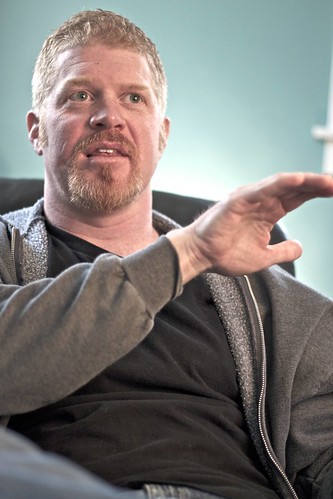 Michael Frayn is a writer who makes other writers jealous, because he can dip into new forms easily and often. Though he made his name as a playwright, and his Noises Off is standard repertory for regional and educational theatre, he has also written highly successful, award-winning novels and nonfiction. (As far as I know, he’s ducked poetry.) After ten years away from novels, he returns with a farce whose noble ambition perhaps exceeds its capacity.
Michael Frayn is a writer who makes other writers jealous, because he can dip into new forms easily and often. Though he made his name as a playwright, and his Noises Off is standard repertory for regional and educational theatre, he has also written highly successful, award-winning novels and nonfiction. (As far as I know, he’s ducked poetry.) After ten years away from novels, he returns with a farce whose noble ambition perhaps exceeds its capacity.London playboy Oliver Fox hates himself and his reputation, and already regrets the weekend rendezvous he’s arranged with a girl he hardly knows. At the baggage claim on the Greek resort island of Skios, he steals the luggage, and the life, of Dr. Norman Wilfred. It seems Dr. Wilfred is committed to speak at a prestigious but shady philanthropic foundation. Oliver’s natural charm wins over wealthy Americans, but he will soon have to deliver a lecture on a topic he knows nothing about.
Elsewhere on the island, Dr. Norman Wilfred can’t find his luggage, his connections, or anything that brought him to Greece. A strange, inarticulate cabbie has dropped him at a decaying holiday villa with an emotionally unstable co-ed, and calling the foundation’s desk just leaves him trapped among goats. As he grows increasingly desperate, he starts to question everything on which he’s built his life, and whether this strange, pretty woman might not be the salvation he needs.
This book starts as a traditional British comedy of manners. In one plotline, Oliver digs himself a hole he knows he can’t get out of, yet he enjoys the attention (and the pretty coordinator) so much that he can’t stop himself. In the other plot, Dr. Wilfred’s Oxbridge pretensions slowly unravel. A primal, lusty caveman lurks beneath his cultured restraints, but the woman he now loves doesn’t share his passions, much less understand. Jane Austen lovers would approve.
 But this is Michael Frayn, and anyone familiar with his work knows he loves to watch lies unravel. Over the course of two hot Mediterranean nights, people pin their hopes on the air, then watch everything fall down around them again. Angry declamations lead to heady cross-island pursuits. Jilted lovers, thought long gone, suddenly reappear. Secrets prove impossible to conceal, and someone pushes Dr. Wilfred to reclaim his life, even though he no longer wants it back.
But this is Michael Frayn, and anyone familiar with his work knows he loves to watch lies unravel. Over the course of two hot Mediterranean nights, people pin their hopes on the air, then watch everything fall down around them again. Angry declamations lead to heady cross-island pursuits. Jilted lovers, thought long gone, suddenly reappear. Secrets prove impossible to conceal, and someone pushes Dr. Wilfred to reclaim his life, even though he no longer wants it back.The giddy pace and emotionally intense storyline feel like they would work on stage or screen. The book is fast-paced, and you can read it in two evenings, but prose puts a limit on something like this. Specifically, where a movie or play drags audiences along and forces them to keep up, readers can put the book down and ask themselves questions. Farce doesn’t do well answering questions. It relies on an audience that remains, in some way, permanently confused.
In pursuit of that, as we approach the end, the dramatis personae takes a quantum leap. People briefly mentioned in early chapters suddenly become major players in the story. A gentle, intimate comedy suddenly has a cast of thousands, all of whom talk past each other. Roger Ebert would call this an Idiot Plot, a story of epic misunderstandings that could easily resolve if one person told the truth. That is, if anybody else were listening.
Which is a shame, because the early chapters are quite good. They contain deep psychological insights and complex cantilevered motivations, all for characters so complex that they can’t understand themselves. We laugh good-naturedly with these characters, at first, because we know them better than they know themselves. They remind us of people we all know, the kind of people who could benefit from a long, solemn conversation with their own bathroom mirror.
Perhaps Frayn is dissatisfied with subtle character humor. Perhaps a writer who made his name slipping philosophical insights into panicky farces thought he needed the big laughs to sell the conclusion. Even he knows how confused the product winds up looking, since he includes a chapter explaining how this story would end in an ordinary farce, right before he suddenly swerves, giving us a conclusion that has little to do with everything that came before.
This should be such a good book. It’s insightful, funny, and rueful, right up to the moment where it implodes. I enjoyed the early chapters, and thought perhaps Frayn was bringing back an older form of gentle but surgical comedy. Then, in the clinch, it turns into stampeding entropy. So close, and yet so far away.

 The decision to build an android in PKD’s likeness was extremely meta. An android image of a writer who envisioned a world where people wondered if they were androids? Really? Then they displayed it in an illusion of
the house in which PKD came to believe all reality was an illusion. Dick, a paranoid amphetamine addict with a gregarious temperament and a flair for the dramatic, could not have choreographed a better science fiction spectacle.
The decision to build an android in PKD’s likeness was extremely meta. An android image of a writer who envisioned a world where people wondered if they were androids? Really? Then they displayed it in an illusion of
the house in which PKD came to believe all reality was an illusion. Dick, a paranoid amphetamine addict with a gregarious temperament and a flair for the dramatic, could not have choreographed a better science fiction spectacle. So it makes sense that PKD could have planned his own resurrection as a remarkably lifelike machine. Even the fact that “Phil” regularly
appeared with his scalp off, showing his complex inner workings, supports such a paradox. How better to soothe the masses, and prevent them fearing they would be exposed as androids, then to expose yourself first? See, people? I’m nothing like you. You’re safe. Stop asking questions and go about your day.
So it makes sense that PKD could have planned his own resurrection as a remarkably lifelike machine. Even the fact that “Phil” regularly
appeared with his scalp off, showing his complex inner workings, supports such a paradox. How better to soothe the masses, and prevent them fearing they would be exposed as androids, then to expose yourself first? See, people? I’m nothing like you. You’re safe. Stop asking questions and go about your day.
 Unfortunately,
he doesn’t maintain that standard. Over a hundred pages in, our
protagonist Daniel picks up a mysterious hitchhiker who does a terrible
job concealing his secret identity. For a guy who claims to know his
blues, Daniel really, really
misses the obvious. Moreover, this stranger introduces an element of
the supernatural—a quarter of the way through the book—that upsets the
balance and changes the tone of the story.
Unfortunately,
he doesn’t maintain that standard. Over a hundred pages in, our
protagonist Daniel picks up a mysterious hitchhiker who does a terrible
job concealing his secret identity. For a guy who claims to know his
blues, Daniel really, really
misses the obvious. Moreover, this stranger introduces an element of
the supernatural—a quarter of the way through the book—that upsets the
balance and changes the tone of the story. My friend
My friend  2. Shifting Ground. If America had always subjected religious houses to property and other taxes at the same rate as private enterprise, maintaining that position would be value neutral. But they haven’t, and it’s not. If a groundswell
of opinion allowed American lawmakers to change the values behind our
tax code, well, a secularist like Duane might not mind. But that would
set a precedent he would not like.
2. Shifting Ground. If America had always subjected religious houses to property and other taxes at the same rate as private enterprise, maintaining that position would be value neutral. But they haven’t, and it’s not. If a groundswell
of opinion allowed American lawmakers to change the values behind our
tax code, well, a secularist like Duane might not mind. But that would
set a precedent he would not like. Let me say, though, what I don’t mean. I don’t consider all positions equal, or think freedom has no constraints. Any position that limits others’ freedom has overstepped its bounds, and we must make sure they are constrained. For instance,
those who use faith in God to justify shooting abortionists or bombing
mosques are not exercising religious freedom. They are criminals, who
should be punished.
Let me say, though, what I don’t mean. I don’t consider all positions equal, or think freedom has no constraints. Any position that limits others’ freedom has overstepped its bounds, and we must make sure they are constrained. For instance,
those who use faith in God to justify shooting abortionists or bombing
mosques are not exercising religious freedom. They are criminals, who
should be punished.










 William the Conqueror claimed he won England at Hastings, but even he couldn’t call himself King until London knelt—which it almost didn’t do. Parliamentary gadfly John Wilkes lit a fire of civil reform in London, one which found its truest home in the Americas. And Keith Richards, initially passed over by the cruel post-war meritocracy, refused to bend until he had remade himself as the bard of a generation.
William the Conqueror claimed he won England at Hastings, but even he couldn’t call himself King until London knelt—which it almost didn’t do. Parliamentary gadfly John Wilkes lit a fire of civil reform in London, one which found its truest home in the Americas. And Keith Richards, initially passed over by the cruel post-war meritocracy, refused to bend until he had remade himself as the bard of a generation.





 In fairness, atheist adherents probably don’t know they have done this. Like a fish explaining water, these advocates have been so immersed in their position for so long that they see it as eminently reasonable. And has happens in such situations, disagreement looks like unreason, even when it’s not. Stokes shows, in several diverse ways, why the evidence does not lead to the conclusion, and why belief in God is as reasonable as its opposite number.
In fairness, atheist adherents probably don’t know they have done this. Like a fish explaining water, these advocates have been so immersed in their position for so long that they see it as eminently reasonable. And has happens in such situations, disagreement looks like unreason, even when it’s not. Stokes shows, in several diverse ways, why the evidence does not lead to the conclusion, and why belief in God is as reasonable as its opposite number.